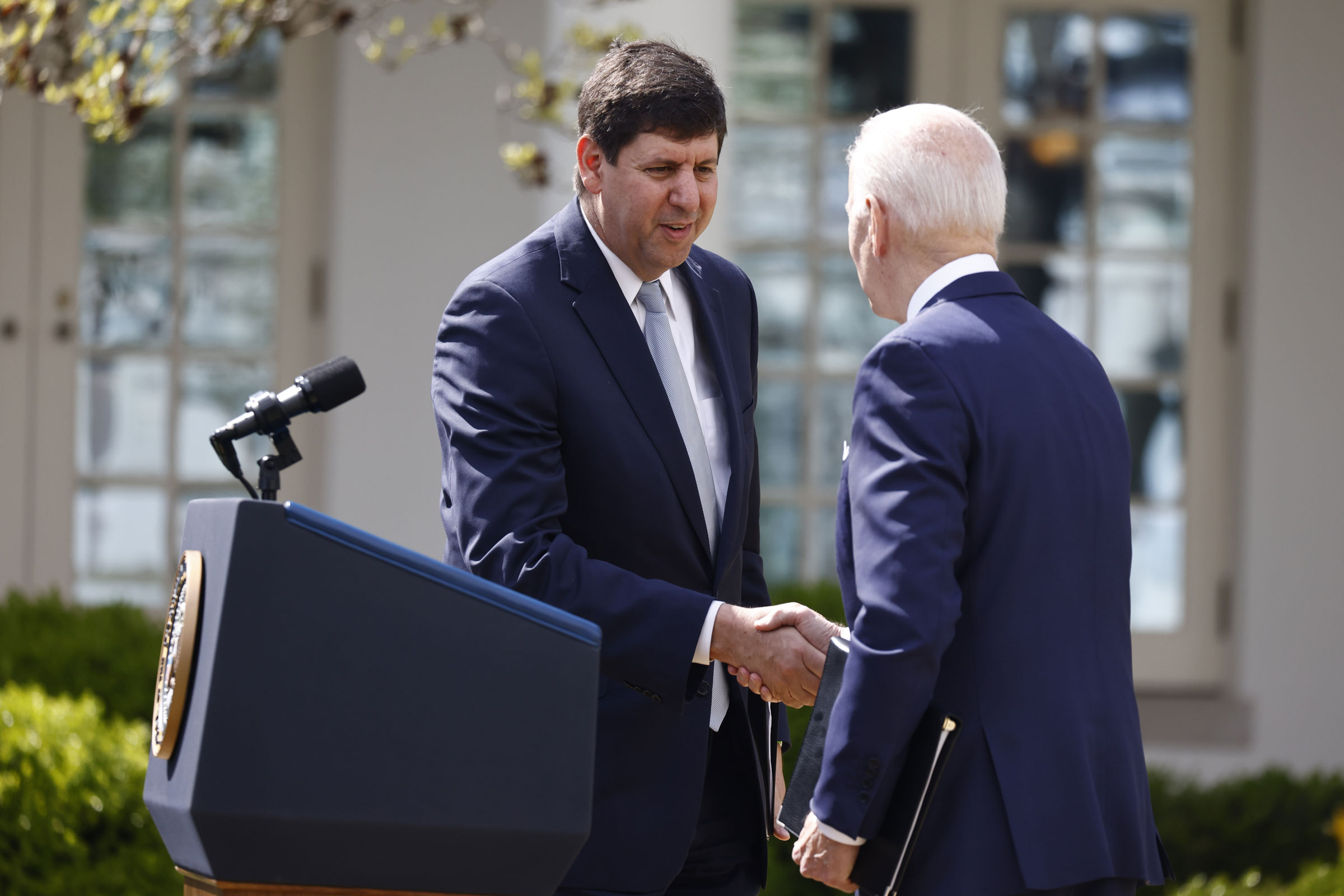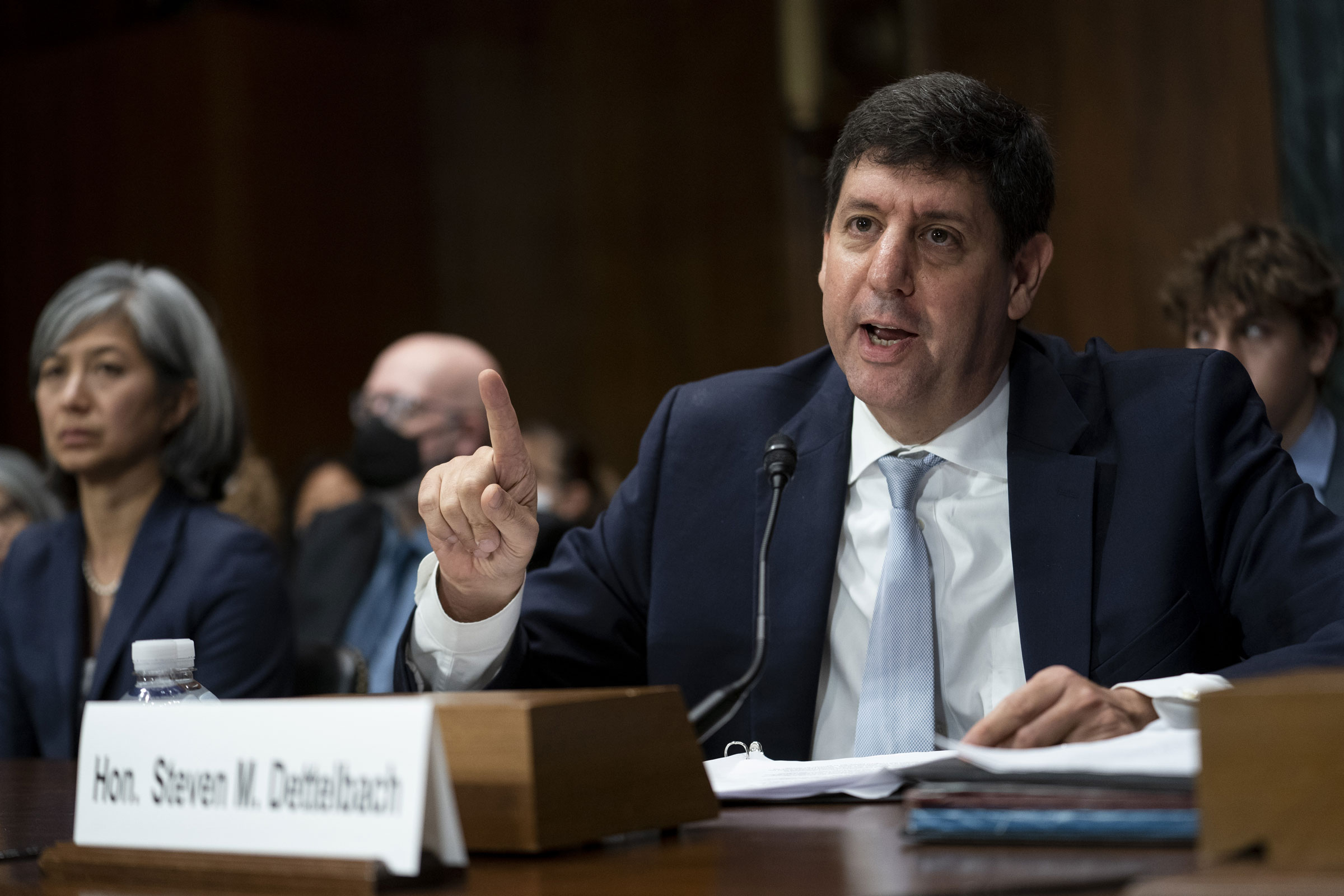
Less than 24 hours after a shooter killed 19 children and two teachers in a Texas elementary school, lawmakers grilled President Joe Biden’s pick to become the nation’s chief regulator of guns.
Frustrations over the intractable gun control debate in Congress spilled over into the pre-scheduled hearing for Steven Dettelbach, Biden’s nominee to be director of the Bureau of Alcohol, Tobacco, Firearms and Explosives (ATF), as Senators pressed him with renewed urgency after the massacre in Uvalde, Texas.
“We need to act to prevent the next shooting,” said Senate Judiciary Committee Chairman Dick Durbin, a Democrat from Illinois, who called for the Senate to take up a measure the House passed last year to expand background checks on firearm sales. Sen. Chuck Grassley, the panel’s ranking member and a Republican from Iowa, instead pushed for separate legislation to enhance security in schools “to make sure dangerous individuals can’t do what happened yesterday.”
The stark contrast between Democrats and Republicans after yet another mass shooting—there have already been more than 200 this year—reflects the rigid partisan divide on guns that remains firmly in place even after the slaughter of innocent children. The Texas tragedy was the deadliest school shooting since 20 children were killed at Sandy Hook Elementary School in Connecticut 10 years ago; it came just 10 days after a racist gunman killed 10 people in a predominantly Black neighborhood in Buffalo, New York. No significant national gun control legislation has been passed in the wake of any of these tragedies.
Against this backdrop, Dettelbach avoided taking a stand on policy ideas to reform America’s gun laws, as GOP lawmakers questioned him about his support for an assault-weapons ban when he ran for Ohio attorney general in 2018.
Sen. Tom Cotton, a Republican from Arkansas, asked him to define what constituted an assault weapon. “When I was a candidate for office, I did talk about restrictions on assault weapons,” Dettelbach said. “I did not define the term and I haven’t gone through the process of defining that term. That would only be for the Congress if it chose to take that up.”

The gun violence prevention movement would view a Dettelbach confirmation as a victory. Shannon Watts, founder of Moms Demand Action, told TIME that he would enact a “comprehensive effort to go after violent white supremacists and rogue gun dealers alike.” But Dettelbach, a former U.S. attorney in Ohio, vowed to approach the job unencumbered by political pressure. “Politics can play no role in law enforcement,” he told the committee. “None at all.”
Dettelbach’s reluctance to weigh in on the politics of gun control may stem from the fact that the ATF has been without a Senate-confirmed director since 2015.
After B. Todd Jones stepped down that March, former president Barack Obama was unable to push a replacement through the Republican-controlled Senate. His successor, Donald Trump, never even bothered to nominate anyone to head the agency. Biden was forced to withdraw his last nominee for the role, David Chipman, a former ATF agent and gun control advocate, because of fierce opposition from the gun rights lobby, Republican lawmakers, and a few Democrats. With an evenly split Senate, Dettelbach will need the support of moderates from states with permissive gun laws who helped to scuttle Chipman’s nomination.
There are signs that the Texas shooting may galvanize lawmakers to finally confirm a permanent ATF head after seven years with acting directors in that role. Sen. Angus King, an independent from Maine who caucuses with the Democrats and did not support Chipman, told CNN on Wednesday that he was “inclined to support” Dettelbach.
While Democrats on the Judiciary Committee used Dettelbach’s hearing to advocate for banning assault weapons and expanding background checks, the chances of passing new gun laws in the current Congress are all but impossible. Republican Senators have been adamant that recent shootings in Buffalo and Uvalde were not reason to strengthen America’s gun laws.
“I think we have in our constitution our Second Amendment rights, and we shouldn’t take away rights for law-abiding citizens,” Sen. Rick Scott of Florida told reporters on Wednesday. Sen. Marco Rubio, also of Florida, added that bans on certain kinds of guns wouldn’t halt deranged people bent on mass murder. “At the end of day, you’re arguing about what they’re using to commit this, and the truth of the matter is these people are going to commit these horrifying crimes, whether they have to use another weapon to do it, they’re going to figure out a way to do it,” he said.
If confirmed, Dettelbach would almost certainly be limited to working inside the contours of existing law to crack down on gun violence. That could include tracing the nation’s gun sales, prosecuting illegal firearm transactions, and regulating gun manufacturing and selling markets. The ATF director also has broad authority to enact regulatory rules changes that can govern how gun laws are enforced.
“I worked under Republican administrations and I worked under Democratic administrations as a federal prosecutor,” Dettelbach said. “People need to have confidence that people in law enforcement’s only agenda is to enforce the law, and if you’re at the ATF, to catch the bad guys and protect the public.”
More Must-Reads from TIME
- Cybersecurity Experts Are Sounding the Alarm on DOGE
- Meet the 2025 Women of the Year
- The Harsh Truth About Disability Inclusion
- Why Do More Young Adults Have Cancer?
- Colman Domingo Leads With Radical Love
- How to Get Better at Doing Things Alone
- Michelle Zauner Stares Down the Darkness
Contact us at letters@time.com